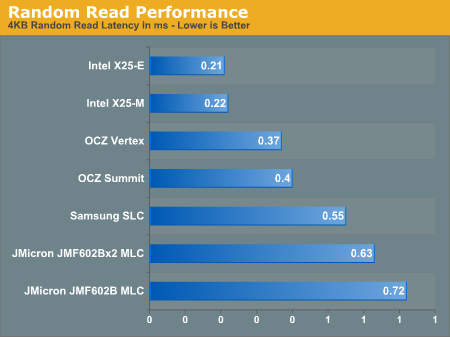The SSD Anthology: Understanding SSDs and New Drives from OCZ
by Anand Lal Shimpi on March 18, 2009 12:00 AM EST- Posted in
- Storage
SSD Aging: Read Speed is Largely Unaffected
Given the nature of the SSD performance-over-time “problem” you’d expect to only pay the performance penalty when writing files, not reading. And for once, I don’t have any weird exceptions to talk about - this is generally the case.
The table below shows sequential read performance for 2MB blocks on new vs. “used” SSDs. I even included data for a couple of the hard drives in the "Used" column; for those numbers I'm simply measuring transfer rates from the slowest parts of the platter:
| 2MB Sequential Read Speed | New | "Used" |
| Intel X25-E | 240.1 MB/s | |
| Intel X25-M | 264.1 MB/s | 230.2 MB/s |
| JMicron JMF602B MLC | 134.7 MB/s | 134.7 MB/s |
| JMicron JMF602Bx2 MLC | 164.1 MB/s | 164.1 MB/s |
| OCZ Summit | 248.6 MB/s | 208.6 MB/s |
| OCZ Vertex | 257.8 MB/s | 250.1 MB/s |
| Samsung SLC | 101.4 MB/s | |
| Seagate Momentus 5400.6 | 77.9 MB/s | - |
| Western Digital Caviar SE16 | 104.6 MB/s | 54.3 MB/s |
| Western Digital VelociRaptor | 118.0 MB/s | 79.2 MB/s |
The best SSDs still transfer data at over 2x the rate of the VelociRaptor.
Read latency is also extremely good on these worn SSDs:

I left the conventional hard drives out of the chart simply because they completely screw up the scale. The VelociRaptor has a latency of 7.2ms in this iometer test with a queue depth of 3 IOs; that's an order of magnitude slower than the slowest SSD here.
Since you only pay the overhead penalty when you go to write to a previously-written block, the performance degradation only really occurs when you’re writing - not when you’re reading.
Now your OS is always writing to your drive, and that’s why we see a performance impact even if you’re just launching applications and opening files and such, but the penalty is much less tangible when it comes to read performance.










250 Comments
View All Comments
Franco1 - Wednesday, March 18, 2009 - link
I've been waiting a long time for this review. It was certainly worth the wait! I would love to see some benchmarks with 2+ drives in RAID configurations via onboard and add-on controller cards. Maybe another follow up?Howard - Wednesday, March 18, 2009 - link
Looks like the Vertex is the drive to get, especially once the user base expands a bit.MagicalMule - Wednesday, March 18, 2009 - link
Thanks for the article. Everyone is critiquing grammar and all this nonsense it seems, but I really enjoyed the article.It was very thorough and very informative.
Keep up the good work. =).
futrtrubl - Wednesday, March 18, 2009 - link
You missed out a VERY significant step that causes the greater part of the slowdown associated with your scenario. After the block is read out to cache the block has to be erased before it can be written to again and as you pointed out earlier an erase cycle, and thus the entire read/modify+erase/write cycle, takes a relatively LONG time, much longer than a simple read/modify/write.Edward
DrKlahn - Wednesday, March 18, 2009 - link
I've worked in IT for 15 years and have played with very fast arrays and know a fair amount about storage. 2 months ago I replaced my Raptor boot/gaming drive with a GSkill Titan. In day to day use I have no stuttering. The only stutter I have seen was while installing a large patch, surfing with multiple windows/tabs open and using Outlook. It wasn't even a second. I did align the partition, turned off drive indexing and defragmentation, and turned on caching. In day to day use it simply kills the Raptor. Games and applications load in a fraction of the time. Vista boot time has decreased dramatically.This isn't a case of purchase justification. If the drive was a dud I would have moved it to a secondary machine, reinstalled the Raptor, and chalked it up as a bad decision. I simply have not run into any scenario in daily use that it performs worse than the drive it replaced and I have not seen any real stuttering in daily use.
Gary Key - Wednesday, March 18, 2009 - link
I have a GSkill Titan drive also and really like it. However, my experiences while positive overall, do not compare with yours when it comes to stuttering (yes, all optimizations have been done to the drive and OS). I still have significant stuttering problems when using multiple IM programs and having multiple windows/tabs open at the same time. I literally have to wait a few seconds when texting colleagues if more than two conversations are occurring at the same time as the system pauses, hitches, and stutters in this scenario. It is especially aggravating when on Skype and trying to text, speak, and transfer files at the same time. This does not occur on the Intel drive in my testing. Apparently, it is no longer a problem on the OCZ Vertex or Summit drives. Except for my example above, I would certainly use the Titan drive over my Raptor any day of the week.druc0017 - Wednesday, March 18, 2009 - link
great article, keep up the good work, cant wait to see more updates, thxmikeblas - Wednesday, March 18, 2009 - link
Is the Velociraptor really "World's fastest hard drive", as this article states? Faster than the Hitachi SAS drives?Gary Key - Wednesday, March 18, 2009 - link
We have changed those statements to "...fastest consumer desktop hard drive...", that was the original intent of the statement, just clarified now. :)7Enigma - Wednesday, March 18, 2009 - link
I think the majority of us understood that. People just like to nit-pick.